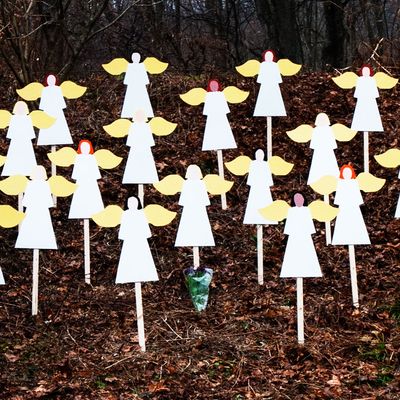
Noah Pozner had just turned 6 when he was shot dead by Adam Lanza at Sandy Hook Elementary School in Newtown, Connecticut, in 2012. He was the youngest of the victims. In the years since, Pozner’s parents, Leonard Pozner and Veronique De La Rosa, moved out of Connecticut to an undisclosed state, partly to get away from the horrible memories that plagued them in Newtown and largely out of fear for their safety. Pozner told New York back in 2016 that he “has moved apartments four times and gets his mail delivered to a P.O. box on the other side of the state,” owing to the number of threats his family, and families like his, received in the wake of the shooting. Many of these threats come from so-called “truthers” — Pozner said he uses the term “hoaxers” as “there’s nothing truthful about it” — who believe that Sandy Hook did not happen and instead was some sort of orchestrated government cover-up. The kinds of lies that spread like crazy on Facebook, a platform that Pozner and De La Rosa say has not done enough to protect the families of victims and prevent false information from spreading. The pair — Pozner and De La Rosa divorced following the shooting — penned an open letter today outlining their struggles and offering solutions for Facebook to consider.
From the letter, via The Guardian:
While terms you use, like “fake news” or “fringe conspiracy groups”, sound relatively innocuous, let me provide you with some insight into the effects of allowing your platform to continue to be used as an instrument to disseminate hate. We have endured online, telephone, and in-person harassment, abuse, and death threats. In fact, one of the abusers was sentenced to jail for credible death threats that she admitted in court she had uttered because she believed in online content created by these “fringe groups”. In order to protect ourselves and our surviving children, we have had to relocate numerous times. These groups use social media, including Facebook, to “hunt” us, posting our home address and videos of our house online. We are currently living in hiding. We are far from alone in our experiences, as many other families who have lost loved ones in mass shootings and other tragedies have reported the same continuing torment.
The letter also addressed the recent interview between Recode’s Kara Swisher and Facebook’s Mark Zuckerberg, in which Zuckerberg managed to really put his foot in his mouth about Holocaust deniers on the platform. “I don’t think that they’re intentionally getting it wrong,” Zuckerberg said of people spreading misinformation on the platform. Swisher noted that Holocaust deniers “might be” intentionally getting things wrong. To which Zuckerberg replied, “It’s hard to impugn intent and to understand the intent. I just think, as abhorrent as some of those examples are, I think the reality is also that I get things wrong when I speak publicly. I’m sure you do.” He also said content gets to stay up so long as “you’re not trying to organize harm against someone, or attacking someone, then you can put up that content on your page, even if people might disagree with it or find it offensive.” (Zuckerberg, who is Jewish, later offered up a second statement clarifying that he “didn’t intend to defend the intent of people who deny [the Holocaust].”)
As for solutions, Pozner and De La Rosa would like to see victims of events like shootings designated as a protected group and would like Facebook to codify attacks against them as being against Facebook’s terms of service. They also suggest providing the families of victims and survivors with specific Facebook personnel who would act as liaisons for removing hateful or false content quickly and without the hoops it currently takes to get something removed from the platform.





























